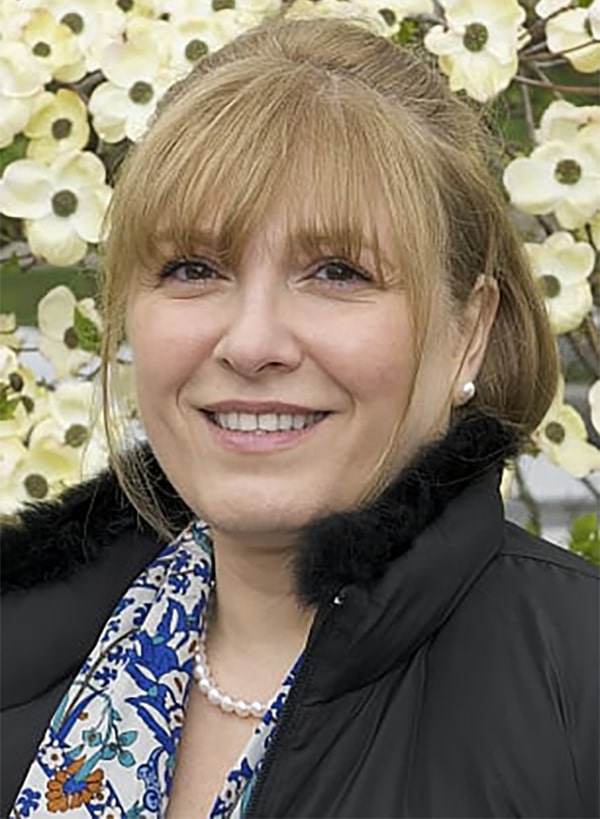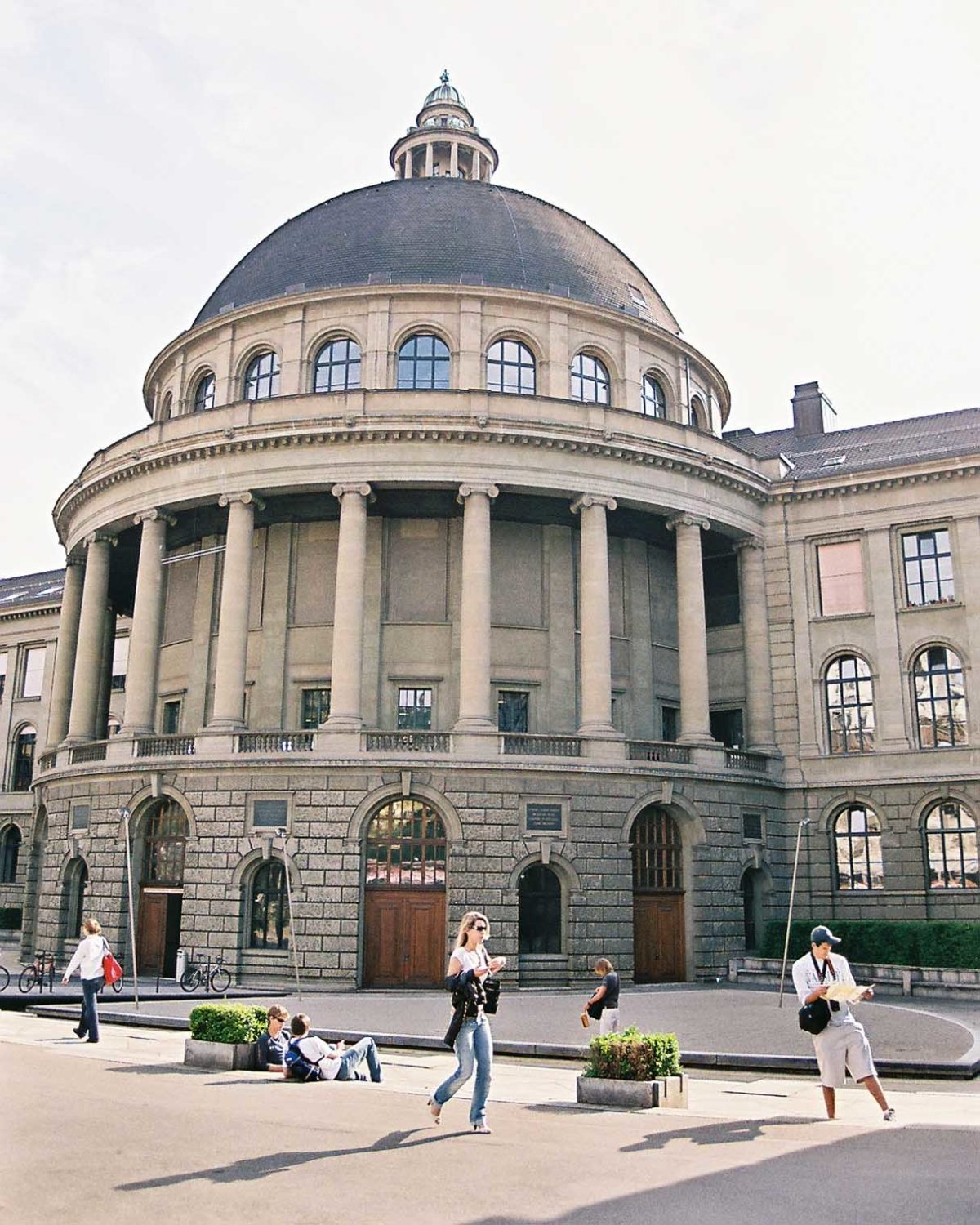In Swiss Academic Science, Charges of Bullying and Gender Bias
In 2002, astrophysicist Marcella Carollo, along with her husband, co-founded the Institute for Astronomy at one of the world’s leading universities for science, technology, engineering, and mathematics: the Eidgenössische Technische Hochschule, or Federal Institute of Technology in Switzerland — also known as ETH Zurich, or simply ETHZ.
“Ever since primary school, I have believed in working hard for the things that I believed in,” Carollo said. “And for most of my life, that was science.”

The decision to permanently remove scientist Marcella Carollo from an elite Swiss university now sits before the school’s board. But some critics say her case belies a culture of gender bias.
Today, Carollo’s future at ETHZ, and possibly the sciences all together, is in question. In August 2017, ETHZ dissolved the institute she had helped establish, and soon after launched an investigation into allegations of misconduct by Carollo. “How has all of this affected my life?” Carollo asked rhetorically in a recent email exchange with Undark. “Plain and simple: The ETH has destroyed the life which I had, and for which I had made many sacrifices.”
The decision to permanently remove Carollo from the university now sits before the school’s board, which is expected to reach a final conclusion within the next two months.
On the surface, Carollo’s case is straightforward: The professor has been accused of mistreating graduate students for more than a decade. Accounts range from creating an “atmosphere of fear” to manipulating co-authorship on academic papers. But some academics, both inside and outside of Switzerland, say that Carollo herself, who has denied the allegations, may be a victim of academic bullying and gender discrimination. They also argue that gender inequity reaches well beyond ETHZ, and that systemic biases continue to plague Swiss academia more generally.
In an April 18 letter sent by faculty members of École Polytechnique Fédérale in Lausanne, Switzerland (EPFL), a sister university to ETHZ, 80 signatories decried what they called an unprecedented move against Carollo — a tack made more troubling, the letter writers argued, given Carollo’s gender. “That the first dismissal in the history of the ETH domain happens to be a female scientist, while only 15 percent of the professors in the ETH domain are female,” the letter declared, “is an additional reason to ensure a careful procedure that is free from any potential gender bias.”
Of most concern, critics of the Carollo case say, is that while a disciplinary commission impaneled by ETHZ to review the administration investigation ultimately recommended putting her on probation, removing her from supervising doctoral students, and requiring her to receive “coaching by an experienced person,” it was also clear in stating that she should not be fired. ETHZ officials chose not to follow this finding, which was published earlier this year, and are pressing ahead with a dismissal action anyway. “A dismissal without proper procedure would create a precedent that could have unintended consequences,” the letter writers added, “that could undermine our collective efforts to improve the system.”
Leadership at ETHZ flatly reject any notion of bias in the handling of Carollo’s case — or in the handling of any other charges brought by students and colleagues against faculty at the institute. “Both the investigator and the commission to review the appropriateness of the dismissal have found that the professor committed serious and prolonged misconduct,” the school declared in a statement provided by ETHZ spokeswoman Vanessa Bleich.
Carollo and others, however, argue that women in the sciences — and in Switzerland in particular — are held to an impossible double-standard, and that their assertiveness as professionals is too often greeted with a brand of dismay and accusation that no male colleague, acting similarly, would face. “Professional disagreements that are tolerated, even expected, even regarded as a manifestation of ‘strength’ amongst male colleagues,” said Carollo, “are indeed taken personally from a female, who is regarded as being ‘very difficult.’”
Indeed, for all of its attributes as a country known for learning and tolerance, some critics say Switzerland harbors a culture of sexism within its academic institutions — and in workplaces more broadly — that would likely surprise many of the country’s peers in the industrialized world. And the problem is apparently serious enough that, according to an email sent on April 29, the Swiss Federal Audit Office, an arm of the Swiss government, will be conducting an audit not just of ETHZ, but of EPFL as well, to understand whether they have systemic issues related to gender bias.
“If I just flip [Carollo’s] name with any name in the [physics] department, a male one,” said Ursula Keller, founding president of the Women Professors Forum at ETHZ and a colleague of Carollo, “it never would have happened.” Keller became the subject of two investigations of her own following her public protests over how the Carollo case was being handled by ETHZ. She was acquitted of all charges in the first; she says the second investigation is ongoing.
Defending yourself against charges, Keller said, “becomes close to a full-time job.”
Gender biases, of course, are not unique to Swiss schools and universities, and several studies have examined how students assess teachers differently based on gender and race. One 2014 analysis by a group of American researchers, for example, observed responses by a few dozen students in an online learning environment to assistant instructors operating under two different gender identities. Regardless of the instructors’ actual gender, both male and female students were more likely to rate the instructors they perceived as male as professional, fair, and respectful.
“I have this conversation with a whole room full of men, and they argue with me that there is reverse discrimination [against them],” Keller said with a note of sarcasm. “And then I look around and say: ‘Yes, I see that. And they don’t get it.’”
Overall, 10 percent of full professors at ETHZ are women, while Keller and Carollo are the only women in the physics department who are full professors out of 28 in total.
Rainer Wallny, the head of ETHZ’s physics department, said in an email message that unconscious gender bias — in both directions — is a consideration in any academic or workplace environment. “At ETH, we are aware of the problem and try to counteract it,” he wrote. “That being said, I am certain that gender played no part whatsoever in the assessment of Mrs. Carollo’s behavior and the conclusions drawn from it.”
Carollo is clear in her critique of such appraisals. “Intelligent male scientists,” she said, “do not like to think of themselves as being biased.”
In March, the intergovernmental Organization for Economic Cooperation and Development (OECD) ranked Switzerland as the best country in the world for women’s rights — due in part, according to a Reuters report, to its “robust laws and social norms that addressed those issues.”
The ranking reflects recent strides made by the Swiss government to encourage both educational institutions and companies to develop action plans, programs, and measures for “improving gender equality,” write the authors of a 2018 book about gender equality in Switzerland. But the overall thrust of that tome was less charitable: “Gender equality has not yet been achieved in many western countries,” the book’s description declares, “[and] Switzerland in particular has been a latecomer in integrating women in politics and economy.”
That’s in keeping with Keller’s perspective. Women were only given the right to vote in Switzerland in 1971, she pointed out — “two years after men were on the moon.” And Switzerland was also slow to establish gender equality in marriage — the legal authority of the husband was not abolished until 1985.
Today, the hurdles women face, particularly in the workplace, remain significant. British news magazine The Economist last year ranked Switzerland as having one of the worst working environments for women out of the 29 countries included in their Glass Ceiling Index. This was partly due to the high cost of child care, poor maternity leave, and a substantial gender pay gap. This is despite gender equality being enshrined in Swiss law, and complemented by policy directives.
Traditional attitudes towards the role of women in society, critics say, are still pervasive in the country. Even the OECD admits in their index that despite measures taken by the Swiss government to improve gender equality in the workplace, “a gender gap in employment remains present, particularly at the executive level” and that “caregiving and housework in Switzerland remains overwhelmingly the domain of women.”
Keller says she grew up with the expectation as a woman, she’d have to move to part-time work when she had a family. As a result, she says, there aren’t many Swiss women who qualify for professor positions at ETHZ and EPFL. Rather, when female faculty like Carollo come in from other countries, many of them describe something of a culture shock upon arrival in Switzerland.
Anna Elsner, a fellow at the University of Zurich’s Institute for Biomedical Ethics and History of Medicine, moved from Great Britain to Switzerland three years ago. She describes how common it is in Switzerland for highly-qualified women to leave work, or go down to part-time, after having children. “This calls for policy changes that allow mothers to return to work and for a deconstruction of the traditional image of the ‘good mother,’” Elsner said.
It’s a well-known problem — particularly in scientific and technical fields. Men are still overrepresented in entering these disciplines at the undergraduate level, and as levels of seniority increase, women leave the profession in droves — a problem known as the “leaky pipeline.”
Elsner, who is currently funded by a Swiss National Science Foundation program aimed at supporting female academics, did add that numerous measures are being taken to tackle these issues. “While there is ample room for improvement, there are signs that these problems are being acknowledged,” she said. The need for support and temporary relief from some academic duties is backed up by research which has found that women in academia tend to do far more of what’s called “institutional housekeeping.” This includes administrative roles such as committee work and monitoring degree programs.
The Carollo case began in early 2017, following a disagreement between the professor and one of her doctoral students. According to the digital Swiss magazine Republik, the university ombudsman received 12 testimonials accusing Carollo of abusive behavior and scientific misconduct. One of them reportedly read: “This woman steals your work, your dreams and your life. She plays with you like a puppet in a theater, and then she breaks you down.”

Overall, 10 percent of full professors at ETHZ are women. Carollo is just one of two women in the physics department who are full professors out of 28 in total.
Visual: Magnus Manske/Wikimedia/CC
Carollo was put on sabbatical leave and an administrative investigation was opened later that year to assess the claims. Then, in January 2018, Carollo said she was “suspended from all duties” after ETHZ opened a second investigation against her, this time for research misconduct. She was cleared of those charges 14 months later — at roughly the same time that ETHZ officials announced a decision to dismiss her.
Kenneth Westhues, an emeritus professor at the University of Waterloo in Ontario, Canada, and an expert on “academic mobbing,” or bullying, analyzed the Carollo case for Republik in March. After examining all relevant documents associated with the case, he was withering in his condemnation of ETHZ’s handling of the case — and of the numerous allegations themselves.
“There is not a single serious infringement,” he told the publication.
According to Westhues’ own research, it’s the “person who stands out from the crowd” who is most at risk of being bullied — whether by their sex, sexual orientation, race, ethnicity, or birthplace. Too often, in academic settings, the people who “stand out” are women, because there are comparatively few of them.
“The Carollo case looks more like mobbing than legitimate dismissal for cause,” Westhues told Undark. “The university’s own investigation shows how an identifiable network of students and administrators gradually took shape, mutually reinforcing a common perception of this professor as a kind of demon or ogre fit only to be expelled.”
Indeed, even as rancor over the Carollo case has drawn a spotlight to inequities in Swiss academic science, accusations against faculty are proliferating. Officials at EPFL, for example, disclosed that eight investigations have been opened against professors since early 2017, compared to 17 investigations between 2008 and 2018. Additionally, of those 17 investigations, 11 were against male faculty and six were against female faculty. Based on the ratio of male to female faculty, critics have pointed out that this means female professors at EPFL were three times more likely to face an investigation.
One female professor, who asked not to be identified for fear of reprisals, also pointed to the gendered language used in some complaints — including one that decried the arrival of “a new queen” in an unspecified academic department. A spokesperson for EPFL said the school was now investigating its investigations, to determine if they are biased.
Want more Undark? Subscribe to our weekly newsletter!
For her part, Carollo believes that as an immigrant to Switzerland, and a non-native German speaker, she was a particularly “easy target” for an institution unprepared for, and unaccustomed to, a female professor who speaks her mind.
Speaking at a press conference in March, ETHZ President Joël Mesot, who has only held the post since January, suggested that the school was taking steps to address student-professor discord, and admitted to some extent that the Carollo case had been mishandled. According to an article in Republik, Mesot spoke of measures being taken to protect doctoral candidates, including allocating at least two professors to advise each student, and increasing staff numbers at the office of the ombudsman. On Carollo, he admitted that the decision to dismiss her was a “very difficult decision.”
Nonetheless, the school is standing by its decision to push for Carollo’s permanent ouster, suggesting that she had offered little evidence that she understood the charges against her. “ETH Zurich is of the opinion that everyone deserves a second chance,” the school declared in its emailed statement. “But where there is no insight, there is no chance of improvement.”
Carollo would be the first dismissal of a professor in the 164-year history of the university.
Keller, along with the 80 professors who signed the April letter in opposition of Carollo’s dismissal, said she believes that due process was not followed in this case. She also pointed to wider oversight problems in academic institutions, whose governing bodies often consist of retired professors. “If these top universities don’t have a good corporate governance, then all hell breaks loose, as we see here,” Keller said.
“We are not set-up for any grievance process against a professor. It’s hit and miss [and] a question of how many friends you have,” she added, “if you go under or you don’t go under.”
Thomas Lewton is a science writer and documentary filmmaker whose freelance film and photography work has been featured on the BBC, VICE, and The Guardian.
Alice McCool is a freelance journalist who lives between Uganda and the U.K. Her work has been published in outlets such as The Guardian, VICE, and BBC News.











Comments are automatically closed one year after article publication. Archived comments are below.
Gender card? I’m embarrassed for you. Clearly the article and the issues raised we’re lost on you.
Maybe she is being targeted because of her gender.
Or maybe she’s an unethical bully and completely unprofessional.
Why do women always play the gender card? Because they can get away with it.